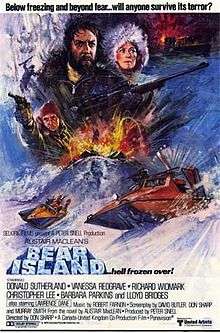Bear Island (film)
| Bear Island | |
|---|---|
 Cinema poster | |
| Directed by | Don Sharp |
| Produced by |
|
| Written by |
|
| Starring | |
| Music by | Robert Farnon |
| Cinematography | Alan Hume |
| Edited by | Tony Lower |
| Distributed by | |
Release dates |
|
Running time | 118 minutes |
| Country |
United Kingdom Canada |
| Language | English |
| Budget | $CAD12,100,000 (estimated) or $9.3 million[1] |
Bear Island is a 1979 Anglo-Canadian thriller film loosely based on the novel Bear Island by Alistair MacLean. It was directed by Don Sharp and starred Donald Sutherland, Vanessa Redgrave, Richard Widmark, Christopher Lee and Lloyd Bridges.
Plot
A UN expedition of scientists from different countries come to barren arctic Bear Island, between Svalbard and northern Norway, to study climate change. However, several of them turn out to be more interested in the fact that (according to the film) there was a German U-boat base on the island during the Second World War. American scientist Frank Lansing (Donald Sutherland) has come because his father was a U-boat commander who died there, and as accidents start to decimate the expedition he begins to realise that some of his colleagues are after a shipment of gold aboard the U-boat that his father commanded.
Cast
- Donald Sutherland as Frank Lansing
- Vanessa Redgrave as Heddi Lindquist
- Richard Widmark as Otto Gerran
- Christopher Lee as Lechinski
- Lloyd Bridges as Smithy
- Bruce Greenwood as Technician Tommy
- Barbara Parkins as Judith Rubin
- Patricia Collins as Inge Van Zipper
- Mark Jones as the Cook
- August Schellenberg as the Marine Technician
- Candace O'Connor as the Laboratory Assistant
- Michael Collins as the Ship's Captain
- Michael J. Reynolds as Heyter
- Lawrence Dane as Paul Hartman
- Nicholas Cortland as Jungbeck
- Joseph Golland as the Meteorological Assistant
- Richard Wren as the Radio Operator
- Hagan Beggs as Larsen
- Robert Stelmach as the Ship's Radio Operator
- Terry Waterhouse as the Helicopter Crewman
Production notes
While the interiors were shot in Pinewood Studios outside London, the outdoor scenes were shot at Stewart, British Columbia and at Glacier Bay National Park in Alaska, depicting a much more dramatic landscape than the real Bear Island offers.[1]
According to the book, The Hollywood Hall of Shame, it was the most expensive film ever made in Canada up till then.[2] Of the budget, $3.3 million came from the British arm of Columbia Pictures, $3 million from Selkirk Film Holdings, $1.8 million from the Toronto Dominion Bank, $1.2 million from the Bank of Montreal, and $100,000 from the Canadian Film Development Corporation.[1]
The Bank of Montreal lent the producers money to make the film. When they could not raise it, they were forced to become investors.[3]
The Swedish invention called Larven (The Caterpillar) by Lennart Nilsson is used in the chases around the island.
The film is rated R13 in New Zealand as it contains violence.
References
- 1 2 3 Bear Island: The Film That Stayed out in the Cold Adilman, Sid . Los Angeles Times (1923-Current File) [Los Angeles, Calif] 11 Mar 1979: m6.
- ↑ Medved & Medved, The Hollywood Hall of Shame (1984), p. 204
- ↑ Harmetz, Aljean (20 November 1979). "Boom in Canadian Film Making Hits Snag: Explosion in Canadian Movies Stuck With the Movie 'A Necessary Shakeup' Begging for Distribution Shortage of Producers'". New York Times. p. C7.
External links
- Bear Island at the Internet Movie Database
- Bear Island at the TCM Movie Database
- Review at AlistairMacLean.com
- Review at Time Out London
- Review at TV Guide
- Review at New York Times